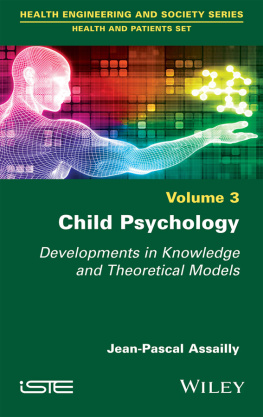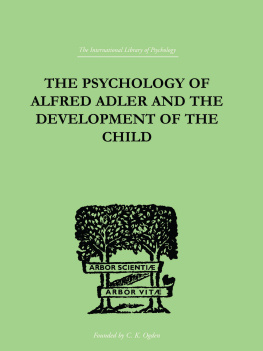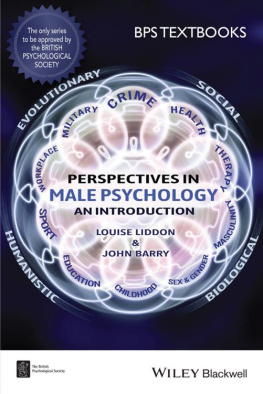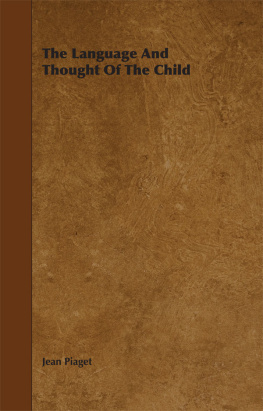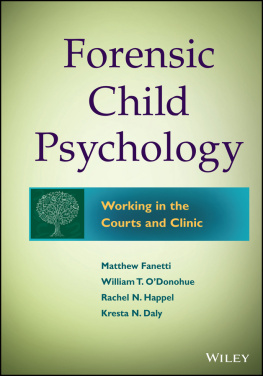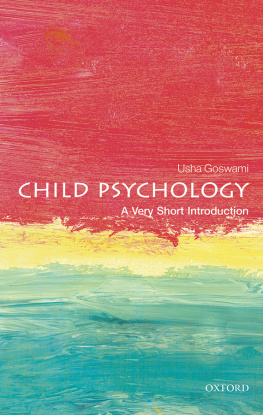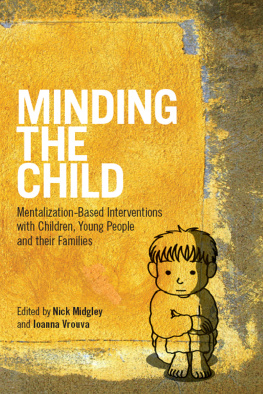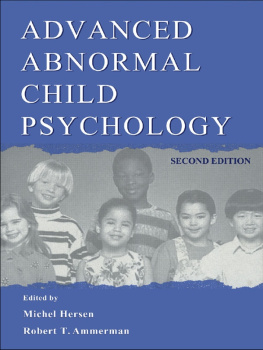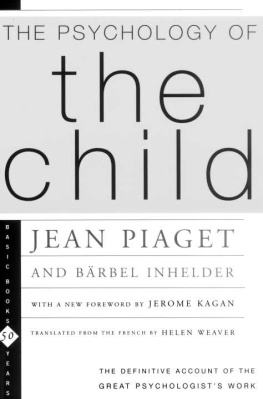
Dedicated to and in memory of Ren Zazzo, to whom I owe all my intellectual training as a researcher in child psychology...
And particularly the 1983 book, O en est la psychologie de lenfant, for continuing the cycle in the hereafter...
Health and Patients Set
coordinated by
Bruno Salgues
Volume 3
Child Psychology
Developments in Knowledge and Theoretical Models
Jean-Pascal Assailly

First published 2022 in Great Britain and the United States by ISTE Ltd and John Wiley & Sons, Inc.
Apart from any fair dealing for the purposes of research or private study, or criticism or review, as permitted under the Copyright, Designs and Patents Act 1988, this publication may only be reproduced, stored or transmitted, in any form or by any means, with the prior permission in writing of the publishers, or in the case of reprographic reproduction in accordance with the terms and licenses issued by the CLA. Enquiries concerning reproduction outside these terms should be sent to the publishers at the undermentioned address:
ISTE Ltd
27-37 St Georges Road
London SW19 4EU
UK
www.iste.co.uk
John Wiley & Sons, Inc.
111 River Street
Hoboken, NJ 07030
USA
www.wiley.com
ISTE Ltd 2022
The rights of Jean-Pascal Assailly to be identified as the author of this work have been asserted by him in accordance with the Copyright, Designs and Patents Act 1988.
Library of Congress Control Number: 2021947915
British Library Cataloguing-in-Publication Data
A CIP record for this book is available from the British Library
ISBN 978-1-78630-423-0
Preface
Each child must be studied as a lock, unique in its mechanism; and then the special key must be devised to fit that lock, so that the door of opportunity may be pened, as wide as the constitution permits, for each child to develop their individual innate capabilities.
White House Conference, 1932
This book is the first in a two-part series:
1) In this book, we study the evolution of our knowledge in the field of child psychology over the last 40 years.
2) In a future work, we will analyze the impacts of this evolution on practices and policies in the field of childhood (schooling, health, safety, parenthood); for this, we will have to question the practitioners.
In 1983, my teacher, Ren Zazzo, published one of his last books, O en est la psychologie de l'enfant? and dedicated it to us (To my students at Nanterre, as a token of my gratitude). After 40 years, we are picking up the baton.
He particularly pointed out the drifts and aporias in the media conception of psychology (the psychology of philosophy professors is psychoanalysis, and what psychoanalysis!); he was disenchanted with the wording and what it covered. The situation has not improved much.
Psychology was for a long time taught in 12th-grade philosophy, tackling various themes such as perception and intelligence, then disappeared from the curriculum in 2003 and was reduced to a few texts by Freud and Lacan. It is amusing to see that National Education adopts the very reductionist view that psychology is the same as psychoanalysis, and vice versa.
However, in various countries (United States, Belgium, Switzerland), psychology is still taught in secondary schools.
When the Ministry of Education formed 40 working groups of professionals for curriculum reform, there was not a single psychologist.
In order to provide some balance to adolescents, during what is a risky time in their lives, importance should be placed on reintroducing knowledge of scientific psychology, on how emotions, relationships, self-knowledge, etc. work.
On bookstore shelves, the most noticeable evolution has been the shift from 90% scientific psychology/10% personal development in the 1970s to 90% personal development/10% scientific psychology today. This says much about the popular conception of psychology. Even in child psychology sections, there is still a lot of emphasis on personal development.
The divisions that Zazzo analyzed are still there:
- between practice and research;
- between child and genetic psychology;
- between the field and the laboratory;
- between the epistemic subject of Piaget and others and the individual in his totality (do we reduce the child to sectors or development indicators, as neuroscience does now, or preserve the psychology of the person?).
Very schematically, the question on which this book is structured (where are we now, 40 years later, and where are we going?) covers two main analyses:
- new developments in child psychology, covering phenomena that did not exist before in a significant way in the real lives of children (e.g. homoparentality, attacks, Covid-19);
new developments in already long established objects of study (e.g. intelligence, the motherchild relationship), where significant theoretical evolutions have taken place.
Table A.1. Historical evolution of the number of French subjects by age group
(source: INSEE 2016)
| Less than 15 years old | 1519 years old | 2024 years old |
| 1991 | 11,808,904 | 4,353,479 | 4,392,026 |
| 1992 | 11,846,294 | 4,186,630 | 4,399,883 |
| 1993 | 11,841,637 | 4,050,716 | 4,427,167 |
| 1994 | 11,809,628 | 3,934,183 | 4,428,102 |
| 1995 | 11,756,031 | 3,894,364 | 4,362,366 |
| 1996 | 11,676,351 | 3,949,740 | 4,242,118 |
| 1997 | 11,601,547 | 4,024,370 | 4,084,939 |
| 1998 | 11,532,939 | 4,067,056 | 3,956,287 |
| 1999 | 11,521,697 | 4,073,140 | 3,848,339 |
| 2000 | 11,558,446 | 4,068,194 | 3,809,829 |
| 2001 | 11,613,651 | 4,037,408 | 3,867,157 |
| 2002 | 11,645,716 | 4,033,889 | 3,945,290 |
| 2003 | 11,669,451 | 4,040,407 | 3,996,557 |
| 2004 | 11,680,487 | 4,103,486 | 4,014,148 |
| 2005 | 11,696,788 | 4,152,069 | 4,037,139 |
| 2006 | 11,715,950 | 4,171,803 | 4,044,928 |
| 2007 | 11,778,201 | 4,146,595 | 4,029,070 |
| 2008 | 11,827,212 | 4,121,673 | 4,003,665 |
| 2009 | 11,917,951 | 4,059,357 | 4,030,922 |
| 2010 | 11,998,951 | 4,011,584 | 4,030,881 |
| 2011 | 12,060,943 | 3,977,327 | 4,014,582 |
| 2012 | 12,123,714 | 3,923,399 | 3,985,089 |
| 2013 | 12,186,689 | 3,909,392 | 3,955,259 |
| 2014 | 12,221,427 | 3,944,210 | 3,877,125 |
| 2014 | 12,318,645 | 3,966,973 | 3,890,578 |
| 2015 | 12,349,774 | 4,009,445 | 3,819,678 |
| 2016 | 12,320,073 | 4,075,385 | 3,765,556 |
With regard to historical developments, one question keeps coming up: are the trends in this or that behavior, situation, phenomenon, etc. decreasing, increasing or remaining stable?
Next page
